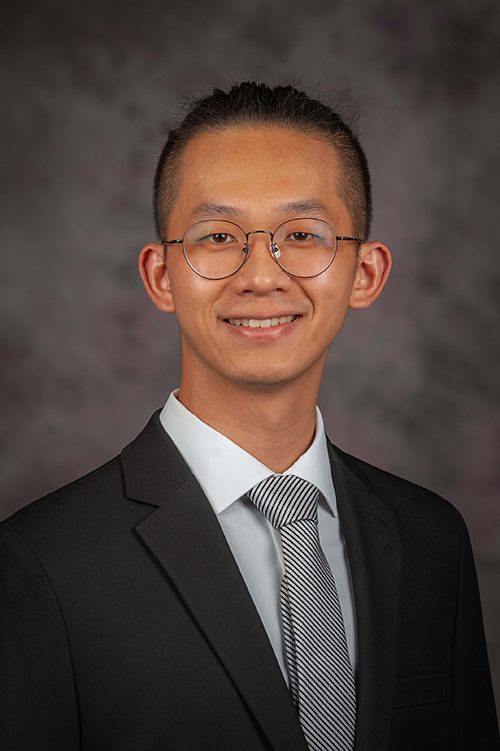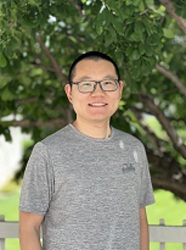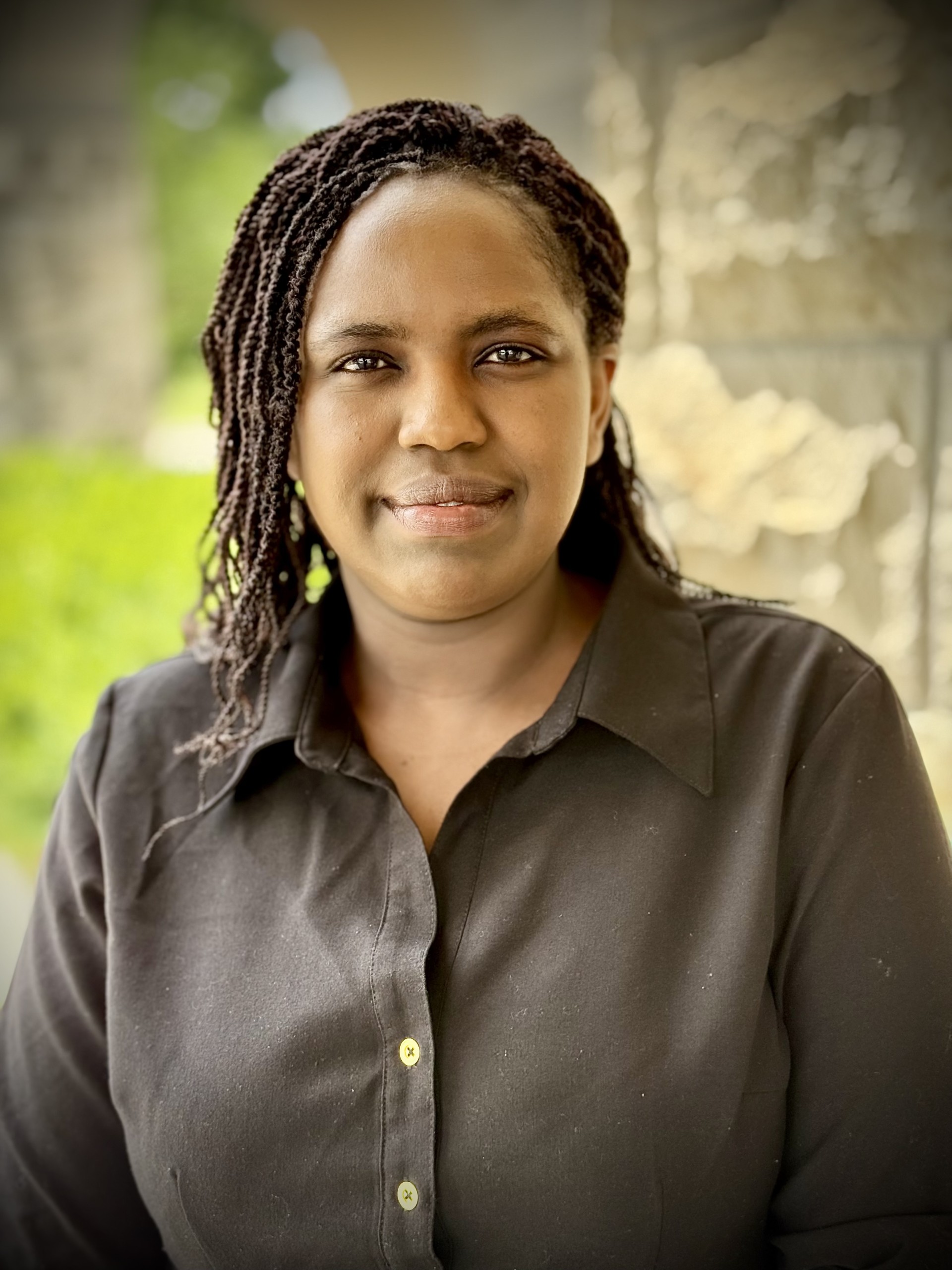Exceptional K-State graduate research scholars to advance human and animal health
Alvin and RosaLee Sarachek awards support the research goals of three outstanding graduate students.
Three Kansas State University doctoral candidates have been recognized for outstanding academic and research achievements in human and animal health, and their work will continue thanks to Alvin and RosaLee Sarachek awards from the Graduate School.
Kuan-Lun Ho, doctoral candidate in mechanical engineering, Zhubei City, Taiwan, and Huiquan Duan, 2025 spring doctoral graduate in biochemistry and molecular biophysics, Henan Province, China, were both awarded $19,000 Alvin and RosaLee Sarachek Predoctoral Honors Fellowships. Huldah Sang, doctoral candidate in diagnostic medicine and pathobiology, Eldoret, Kenya, was awarded the $1,500 Sarachek Scientific Travel Award.
Alvin and RosaLee Sarachek, Wichita, established the fellowship and travel awards to recognize resident graduate students enrolled in K-State doctoral programs who have demonstrated exceptional research and scholastic accomplishments. They wanted to contribute to the tradition of excellence by recognizing students who have demonstrated exceptional research accomplishments involving molecular approaches to biological problems. A selection committee composed of interdisciplinary graduate faculty determines the fellowship and travel award recipients.
Kuan-Lun Ho

Ho's research has advanced the development of fast, precise and highly sensitive diagnostic technologies for foodborne pathogens. These pathogens are responsible for around 265,000 infections in the U.S. each year, creating an economic burden that surpasses $342 million nationwide and $37 million in Kansas alone.
Ho's research focuses on advancing digital electro-microfluidics for point-of-care diagnostic applications. The digital microfluid technology allows for precise control of tiny fluid droplets to enable faster and more efficient molecular-based medical testing.
Current gold standard methods can take up to a week to deliver results. To overcome these limitations, Ho's research focuses on single-cell detection of Shiga toxin-producing E. coli, or STEC — a group of E. coli bacteria that produce powerful toxins that can cause severe illness — using a microfluidic platform, aiming to reduce the time from sample to result to less than 24 hours.
Through extensive research and practice, Ho has developed a novel droplet generation technique called electro-emulsion, intended for applications in both food safety and clinical diagnostics. This enables faster response to outbreaks, minimizes the spread of infection and supports timely public health interventions.
Ho's co-major professors are Mingjun Wei and Shih-Kang Fan, both professors of mechanical engineering.
With the scholarship funds from the Sarachek fellowship, Ho will conduct the final stages of his doctoral research. After completing his Ph.D., Ho plans to continue his research at K-State as a postdoctoral researcher. He will focus on diagnostic applications and explore entrepreneurial opportunities to bring his innovations to the market. The fellowship funds will support this goal and allow him to attend key scientific conferences and innovation-focused workshops to present his work.
Huiquan Duan

Duan's research focuses on identifying and developing novel strategies to inhibit the human complement system, a critical component of the innate immune response.
While the complement system plays a vital role in defending against pathogens, its uncontrolled activation can lead to serious autoimmune diseases. His work explores various complement inhibition strategies, including engineered complement receptors, small molecule inhibitors, synthetic DNA aptamers, and naturally derived inhibitors from arthropods and bacteria.
Current therapies often lack specificity or result in side effects. Duan's research aims to address the need for more effective and targeted treatments for complement-mediated diseases.
By developing new classes of inhibitors with improved precision, his work can lead to safer and more effective therapeutic options for patients suffering from autoimmune and inflammatory conditions. These findings also expand the understanding of immune regulation, which can benefit a broad range of biomedical applications.
Duan's major professor is Brian Geisbrecht, university distinguished professor of biochemistry and molecular biophysics.
Duan will use the Sarachek fellowship funds to support his transition to a postdoctoral position at the University of Pennsylvania this summer, where he will continue to research complement pathobiology and therapeutic interventions. The funds will provide critical support to advance Duan's long-term goal of becoming an independent investigator focused on immune-based therapeutics.
Huldah Sang

Sang's research aims to develop a platform for improved vaccine delivery. After the Ebola outbreak in West Africa and the global COVID-19 pandemic, she felt the pull to pursue a career in vaccinology.
Her work involves using viral vectors to act as delivery vehicles to express immunogenic antigens to trigger protective immunity against pathogens. Vectors that can replicate in the host offer the advantage of sustained antigen exposure that promotes stronger and longer-lasting immune memory.
In cattle, for instance, the bovine parainfluenza 3 virus, or BPI3V, and the bovine viral diarrhea virus, or BVDV, are the main contributors responsible for the Bovine Respiratory Disease Complex, which leads to pneumonia and death in calves — a multibillion-dollar loss annually. While current commercial vaccines are mostly based on a single-strain live attenuated mutant, they do not provide broad protection against diverse and emerging BPI3V and BVDV strains.
To combat the ever-changing virus strains, Sang developed a novel replication-component viral vector based on the Bovine Parainfluenza 3 Virus genotype-C that will stop the virus from replicating in the host. She utilized the vector to generate live recombinant mucosal vaccines capable of inducing broad protection against respiratory bovine diseases. Additionally, these vaccines can be administered in mass without the need to restrain the animals.
Sang's major professor is Waithaka Mwangi, professor of diagnostic medicine and pathobiology.
As the recipient of the Sarachek travel award, she plans to use the funds to attend the International Vaccine Congress in Orlando, Florida. At the conference, she will be able to network with leading experts across the vaccine industry to gain insights from professionals about cutting-edge research and innovations in vaccinology.
###
Media contact: Division of Communications and Marketing, 785-532-2535, media@k-state.edu
News tip: Wichita
Website: k-state.edu/grad/financial-support/scholarships-fellowships-grants/sarachek/
Photos available: Download photos of Kuan-Lun Ho, Huiquan Duan and Huldah Sang.
